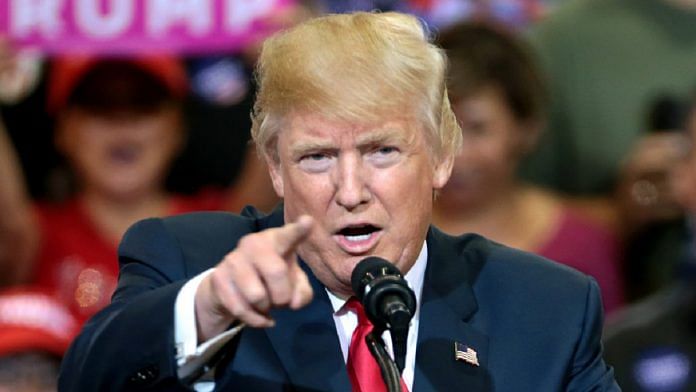Responding to Iranian President’s aggressive statement, Trump put out a tweet that may have repercussions on the future of international relations in Asia.
New Delhi: On Sunday, US President Donald Trump responded to Iranian President Hassan Rouhani with an aggressive tweet.
To Iranian President Rouhani: NEVER, EVER THREATEN THE UNITED STATES AGAIN OR YOU WILL SUFFER CONSEQUENCES THE LIKES OF WHICH FEW THROUGHOUT HISTORY HAVE EVER SUFFERED BEFORE. WE ARE NO LONGER A COUNTRY THAT WILL STAND FOR YOUR DEMENTED WORDS OF VIOLENCE & DEATH. BE CAUTIOUS!
— Donald J. Trump (@realDonaldTrump) July 23, 2018
This show of aggression came after Rouhani had hit out at the US for pulling out of the nuclear deal between the countries. “Mr Trump, don’t play with a lion’s tail… It will only lead to regret,” Rouhani had said. He had also warned that a war with Tehran would be the “mother of all wars”.
The Trump administration had pulled out of the deal on 8 May this year and re-imposed sanctions on Iran, leading to the Iranian parliament erupting in agitation. Members of parliament went to the extent of burning the US flag and shouting slogans like “Death to America”.
What is the Iran-US nuclear deal?
In 2015, the US government, along with the UK, China, Russia, France and Germany (P5+1), were able to bring Iran on the negotiation table to sign the Joint Comprehensive Plan of Action (JCPOA).
The JCPOA wanted Iran to enrich its uranium to only 3.67 per cent and to reduce its uranium stockpile by 98 per cent. It also placed restrictions on operating its heavy water Arak reactors.
A year later, the International Atomic Energy Agency (IAEA) certified that Iran had brought down its uranium enrichment as per the norms set by the JCPOA. This is when Iran broke free of the sanctions imposed upon it. According to this agreement, the IAEA would conduct regular inspections to check Iran’s adherence.
Trump’s aversion to the deal
Trump, in his election campaigns, made his disdain for this nuclear deal evident. According to him, the Barack Obama administration’s policies were “decayed and rotten”, and needed to be done away with. Trump, even during Obama’s administration, was seen anticipating an attack on Iran.
Polls are starting to look really bad for Obama. Looks like he'll have to start a war or major conflict to win. Don't put it past him!
— Donald J. Trump (@realDonaldTrump) October 17, 2012
Trump had promised to pull out of the deal if he became President, and implemented his promise on 8 May. In an official press release, he was seen signing a presidential memorandum reinstating sanctions on Iran.
A month after the withdrawal from the deal he tweeted figures showing that the Iranians had been harassing US warships for the last three years.
US Secretary of State Michael Pompeo also tweeted a number anti-Tehran posts in Farsi and English.
میوه #چهل_سال #انقلاب_اسلامی ایران تلخ بوده است. چهل سال #دزدسالاری. چهل سال که ثروت مردم صرف #تروریسم شده است. چهل سال که ایرانیان به خاطر ابراز حقوقشان محبوس شده اند. ما امیدواریم چهل سال بعدی توام با #آزادی باشد، نه #سرکوب. pic.twitter.com/UNEZIqyrMw
— Secretary Pompeo (@SecPompeo) July 23, 2018
ایدئولوژی #رژیم_ایران ایرانیان را چنان خشمگین کرده که نمی توانند کشورشان را نرمال بخوانند. #قانون_اساسی ای که نابودی همسایه اش را تقدیس می کند نرمال نیست. #شکنجه مردمش نرمال نیست. بزرگترین کشور #حامی_تروریسم بودن، نرمال نیست. pic.twitter.com/ZqEbwhjabX
— Secretary Pompeo (@SecPompeo) July 23, 2018
While Trump hasn’t yet decided what sectors to impose sanctions on, a penalty on the central bank will hit the oil industry the hardest.
Impact on international relations
This latest exchange of threats has dangerous undertones for international relations in West Asia.
Iran is miffed with these developments, because it says it has made a constant effort to adhere to the deal.
The other nations who were part of the deal also distanced themselves from the US’s move. Federica Mogherini, the European Union High Representative for foreign affairs and security policy, said the EU’s policy towards Iran would not change as long as it complied with the deal. She added the EU would act to protect its economic and security interests, implying in parts of her address that it was not in the US’s hands to unilaterally dismiss the agreement.
Signatory countries have regularly received updates from the IAEA regarding Iran’s compliance to the agreement.
Can it affect India?
India has much to lose in this battle between Iran and the US. Not only does India have a large stake in the Chabahar port located near the Persian Gulf, but Iran is also its second largest source of oil. Geo-strategically, Iran is India’s only established entry point into Central Asia which bypasses Pakistan.
The US, on the other hand, is a big market for Indian exports. It was also a key player in getting India to go public with its nuclear programme.
During her recent visit to India, US Ambassador to the UN Nikki Haley stated that if India does not reduce its oil imports from Iran, it would be subject to US sanctions. Blaming Iran for most of the conflicts in the region, Haley advised India to reconsider its relations with Iran.
The Trump administration has turned this matter into a zero-sum game; it has now become ‘us versus them’, and India seems to be caught right in the middle.
It is not clear yet the choices Delhi will make. Although India has often stated that it will only abide by UN sanctions and not imposed by any third country (like the US), it is likely that India may not want to antagonise the Americans.
Moreover, Donald Trump has been invited for India’s Republic Day celebrations as chief guest in 2019. India would certainly not want to be seen to taunting Trump by siding with the Iranians.



